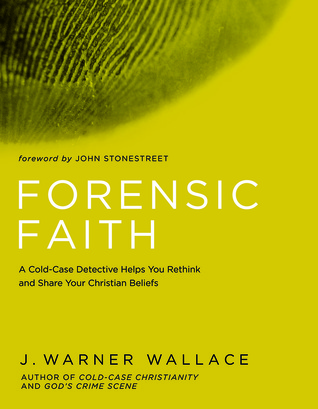 |
Forensic Faith
by J. Warner Wallace ISBN-13: 9781434709882 Paperback: 304 pages Publisher: David C Cook Released: May 1, 2017 |
Source: ebook review copy from the publisher through NetGalley.
Book Description, Modified from NetGalley:
Forensic Faith will help readers: understand why they have a duty to defend the truth, develop a training strategy to master the evidence for Christianity, learn how to employ the techniques of a detective to discover new insights from God’s Word, and become better communicators by learning the skills of professional case makers.
With real-life detective stories, fascinating strategies, and biblical insights, Wallace teaches readers cold-case investigative disciplines they can apply to their Christian faith.
My Review:
Forensic Faith explains why Christians need to learn the evidence supporting the Christian faith and teaches some basic apologetics skills. The first part of the book made the case for why it's important not to just have blind faith that Christianity is true but to understand the evidence that confirms it's true and to build your skill at sharing this information.
Many Christian kids are losing their faith due to unanswered questions, yet the answers are out there. We need to train our kids (and adults) with the answers. Training involves practice, and the author described how he's done this with youth groups. I totally agree that kids should be taught the evidence and the skill to share it. I taught myself some of this way back when I first went to college, and it made a huge difference.
The author was a cold-case detective. In the second part of the book, he explained how skills he used as a detective can be applied to spotting evidence for Christianity and using this evidence to make a case for it. A lot of this information was from (and covered in greater detail in) his previous two books. If you've read those books, you're probably already convinced that it's important to learn and share the evidence for Christianity, but you might still be interested in his suggestions on how to train youth groups or on using the evidence to "make a case" when asked why you believe. However, I'd mainly recommend this book to Christians who aren't very familiar with the evidence supporting their faith.
If you've read this book, what do you think about it? I'd be honored if you wrote your own opinion of the book in the comments.





No comments:
Post a Comment